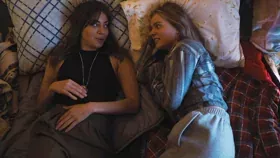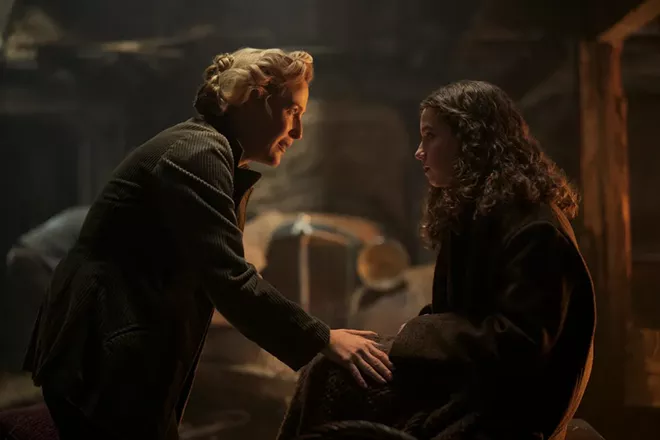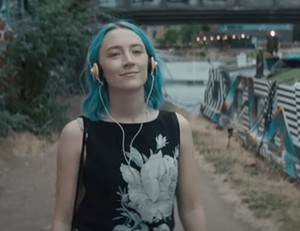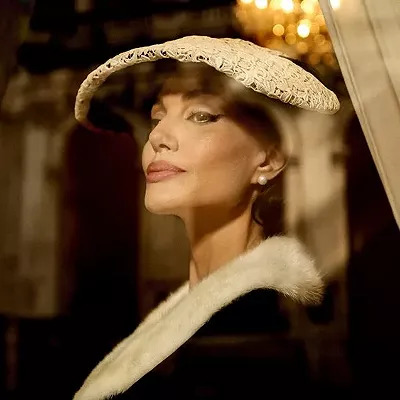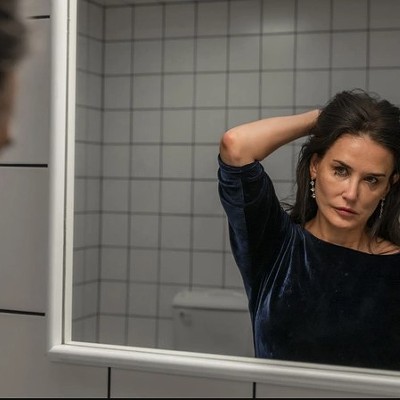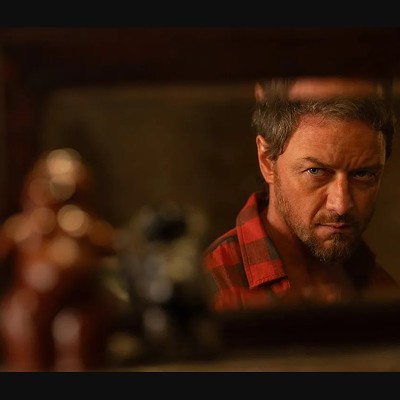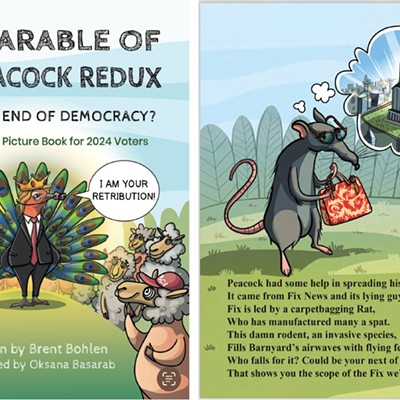Old an unexpectedly moving look at hope and regret
Promoted as a “coming-of-age” story, Megan Park’s My Old Ass is far more than a ribald teen comedy. Rather, it’s a film for those who’ve lived with regret, those who wish they could turn back the clock to, what have become in retrospect, key moments in their life.
Elliott (Maisy Stella) is a young woman eager to start her life. Liberal in her thinking, she has little patience for her brothers and, like so many 18-year-olds, is convinced her parents know nothing about the world and even less about her. Starting college in the fall, she hopes to have one last memorable summer with her friends Ro and Ruthie (Kerrice Brooks and Maddie Ziegler, respectively). Keen to experience all life has to offer, the girls decide it’s time to try psychedelic drugs and score a bag of mushrooms, which they indulge in on an all-night camping trip. While Ro and Ruthie have rather predictable trips, what occurs to Elliott falls outside the realm of possibilities. She meets herself, at the age of 39 (Aubrey Plaza).
Obviously nonsensical, it proves to be a brilliant narrative device as the conversations that ensue between the Elliotts are initially hilarious. The older version takes offense when her younger self refers to herself as middle-aged, the first of many questions that initially take the elder Elliott aback, but which, of course, she answers. Good advice is given to young Elliott as she’s told to spend more times with her brothers, be more sympathetic towards her mother, and, above all else, avoid anyone named “Chad.” Not knowing anyone by the name, she ignores this warning…that is, until she’s introduced to Chad (Percy Hynes White), a young man hired to work on his father’s cranberry farm.
While Elliott doesn’t follow all the advice given to her, the fact that she has encountered her older self makes her question everything. Of course, she begins to see her brothers and mother in a new light, but meeting her future self shifts her perspective about a great many things in myriad ways. Suddenly, she begins to question her sexual orientation, whether she wants to attend college and the importance of her family farm.
The most immersive films are those that provide the viewer with a vicarious experience. Park knows this, as her premise is one each viewer can relate to and would likely want to participate in. Who among us hasn’t wished we could turn back the clock to rectify a past wrong, take advantage of a lost opportunity or change a decision we’ve come to regret? While the older Elliott’s presence is minimal, older viewers will be able to relate to her regret, as well as her desire to change that which has harmed her. Unfortunately, relying on an impulsive teenager proves to be problematic.
I suspect this movie that will have a long life. As we age and grow, our perspective changes and films of this sort offer fresh insights when we return to them over the years. As such, Old will continue to resonate as its story will become more meaningful as we experience more of the joy and regret life offers us. In theaters.
Bird familiar but effective
With the current state of things, it’s obvious that we need to once more be reminded of the virtues of the Golden Rule. Marc Forster’s White Bird proves to be better than most in delivering this message. An intimate story of a grandmother’s efforts to steer her grandson down the right path, she recounts her own experiences to him as an example of the power of kindness. Based on the novel by R.J. Palacio, a pseudo-sequel to his best-selling Wonder, the film’s depiction of holocaust is narrow in focus, appropriate for the teen audience it’s aimed at. Its intent is to establish a vicarious connection between the younger viewer and one of its characters, which Forster and his cast do with little overt manipulation.
Julian (Bryce Gheisar), the young man expelled from Yates Academy in Wonder for bullying Auggie, is the initial focus. Having trouble fitting in at his new school and often left to fend himself because of his far-too social parents, his grandmother (Helen Mirren) senses he’s a bit lost and doesn’t understand the impact of his past actions. So, a story is told, and a flashback ensues.
We see the grandmother, Sara (Ariella Glaser), as a preteen, privileged, insular and oblivious to the changes going on around her. The influence of the Nazis is slowly creeping into her life, something she pays no mind to until it directly impacts her. While at school one day, she’s informed her parents have been taken away and that soldiers are coming to do the same with her and other Jewish students. In the confusion, she manages to slip away and by chance is found by Julian (Orlando Schwerdt), a classmate afflicted with polio, the target of constant bullying. He takes her to his home where his parents (Gillian Anderson and Jo-Stone Fewings) welcome and shelter her, hiding her in their barn.
What plays out is all-too familiar, yet still manages to prove impactful. Sara and Julian manage to see one another through eyes of newfound understanding. Shooting on location in the Czech Republic and with an era-accurate production design from Jennifer Williams, the sense of place is authentic. This, coupled with the slow sense of dread that envelopes the story, the viewer is primed for the tragedy that ensues. Again, geared towards a younger audience, Forster walks a fine line between being overly graphic in his depiction of the story’s violence and dulling its impact. He succeeds handsomely in this regard, pulling no punches in focusing on the emotional tragedy of the events. He’s bolstered by his sincere cast, particularly Glaser and Anderson, who provide the sort of vicarious pain vital for the movie to succeed. While modest in intent, White Bird does justice to those for whom they speak. In theaters.
Ronan a revelation in Outrun
Nora Fingshceidt’s adaptation of Amy Liptrot’s memoir The Outrun tells the story of one woman’s struggles with addiction and the ultimate salvation that she finds. It’s a moving story that’s a bit of a muddle, as Fingshceidt takes an overly arty approach to the material that proves vexing. However, the lead performance from Saoirse Ronan is nearly worth the price of admission, the actress delivering a deeply moving portrayal of a woman incapable of quelling her demons, her salvation ever elusive.
Taking place on the Orkney Islands in Scotland, Rona (Ronan) is unmoored, having returned to her parents’ isolated sheep farm after leaving rehab. Through flashbacks, some brought about through moments of PTSD, we see her recent past in London, the events that led to her current state. Drinking to the point of blacking out, her alcoholism had taken control of her, leading to her losing her job and being unemployable, as well as ostracizing her friends, including her longtime boyfriend, Daynin (Paapa Essiedu).
Only after being assaulted while inebriated does she seek help, her journey toward sobriety one she does not fully embrace. As such, her recovery is not without its setbacks, promising starts being scuttled once the stress of life becomes too much, or when she spends too much time with her father (Stephan Dillane). Having been diagnosed as bipolar, his condition had a profound effect on Rona as a child, while his continued lack of progress towards stability sows doubt that she could ever succeed in her own recovery.
Fingshceidt’s choice to tell Rona’s tale in a non-linear manner to reflect her scattered state of mind looks good on paper but fails to translate to the screen. The result is a fractured, frustrating experience that requires an investment from the viewer not all will be willing to make. The intent of the movie’s style and approach is admirable yet, in the end, flawed.
Ronan has always been one of her generation’s most capable actresses and one who consistently challenges herself as well. In many ways, this is her best, most nuanced performance, a turn that taps into deep wells of pain and doubt the actress displays with abandon. Required to run a gamut of emotions, she’s captivating throughout, demanding our attention not simply because of her efforts but to take note of Rona’s suffering and courage.
Ronan carries the film, keeping us engaged even as Fingshceidt’s approach keeps us at arm’s length. While The Outrun is noble in its intent and its lead’s performance is well-worth recognition, its lack of accessibility ultimately dulls its impact. In theaters.

